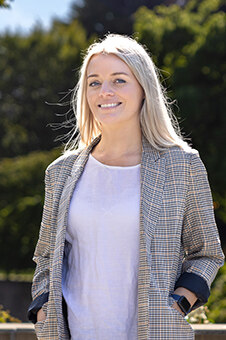The University of Otago’s Dr Jemma Geoghegan is only the second woman to have ever won the Te Puiaki Kaipūtaiao Maea Prime Minister’s MacDiarmid Emerging Scientist Prize.


She is one of the scientists behind New Zealand’s COVID-19 genome sequencing programme and plans to use the $200,000 prize to inspire more women to pursue science and “demolish the stereotype of what a scientist looks like”.
“I’m still in shock from having received this privilege,” Dr Geoghegan says.
“Being the second woman to have received this award makes me feel like I’m contributing to breaking the stigma of what it means to be a person in science and it’s also so rewarding to see the research we are doing on infectious diseases getting this recognition and support.”
Dr Geoghegan believes that the COVID-19 pandemic presents an opportunity to highlight the great importance behind infectious disease research and plans to use the funds from this award to support further research and student training.
“I plan to use this money for ongoing research in my lab to explore viruses in nature and to better understand their ecology and evolution,” Dr Geoghegan says.
“I also want to build more capability in this area to train the next generation of scientists so that we are better prepared for the next pandemic.”
Based in the Department of Microbiology and Immunology, Dr Geoghegan is a Rutherford Discovery Fellow who works with the Institute of Environmental Science and Research (ESR) to understand how viruses might evolve and spread.
When the COVID-19 pandemic first reached New Zealand in 2020, she helped to establish genome sequencing of COVID-19 cases in the country in collaboration with other scientists at ESR.
“Sequencing a genome is basically reading the instruction manual of that living organism,” Dr Geoghegan says.
“All living organisms have a genome; they are made up of letters which provide instructions about what that organism will do and viruses actually have quite small genomes.”
This information enabled public health decision makers to avoid more lockdowns than necessary, and improve their understanding regarding COVID-19 transmission during flights and in managed isolation facilities
Dr Geoghegan’s work is unique, highly cited and influential, with her next research investigation looking at why and how viruses move to new hosts in the first place to better understand virus diversity.
“I think the best thing about this work is the collaborators that I get to work with now on a daily basis,” Dr Geoghegan says.
“Seeing what started out as our research project quickly be integrated into helping New Zealand better understand and respond to the pandemic was particularly rewarding.”







































